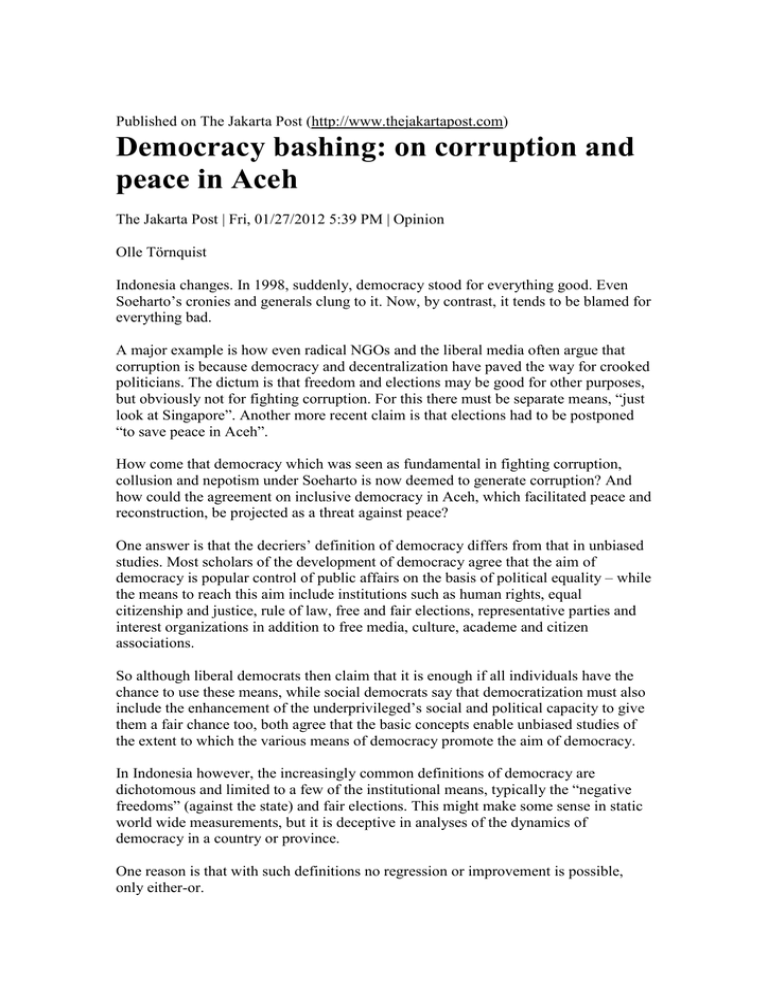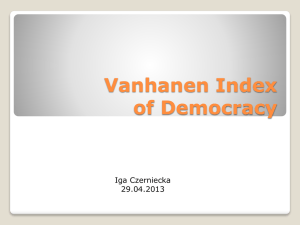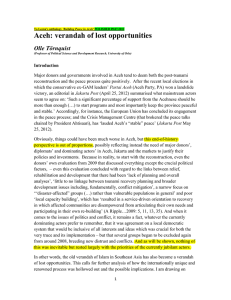
Published on The Jakarta Post (http://www.thejakartapost.com)
Democracy bashing: on corruption and
peace in Aceh
The Jakarta Post | Fri, 01/27/2012 5:39 PM | Opinion
Olle Törnquist
Indonesia changes. In 1998, suddenly, democracy stood for everything good. Even
Soeharto’s cronies and generals clung to it. Now, by contrast, it tends to be blamed for
everything bad.
A major example is how even radical NGOs and the liberal media often argue that
corruption is because democracy and decentralization have paved the way for crooked
politicians. The dictum is that freedom and elections may be good for other purposes,
but obviously not for fighting corruption. For this there must be separate means, “just
look at Singapore”. Another more recent claim is that elections had to be postponed
“to save peace in Aceh”.
How come that democracy which was seen as fundamental in fighting corruption,
collusion and nepotism under Soeharto is now deemed to generate corruption? And
how could the agreement on inclusive democracy in Aceh, which facilitated peace and
reconstruction, be projected as a threat against peace?
One answer is that the decriers’ definition of democracy differs from that in unbiased
studies. Most scholars of the development of democracy agree that the aim of
democracy is popular control of public affairs on the basis of political equality – while
the means to reach this aim include institutions such as human rights, equal
citizenship and justice, rule of law, free and fair elections, representative parties and
interest organizations in addition to free media, culture, academe and citizen
associations.
So although liberal democrats then claim that it is enough if all individuals have the
chance to use these means, while social democrats say that democratization must also
include the enhancement of the underprivileged’s social and political capacity to give
them a fair chance too, both agree that the basic concepts enable unbiased studies of
the extent to which the various means of democracy promote the aim of democracy.
In Indonesia however, the increasingly common definitions of democracy are
dichotomous and limited to a few of the institutional means, typically the “negative
freedoms” (against the state) and fair elections. This might make some sense in static
world wide measurements, but it is deceptive in analyses of the dynamics of
democracy in a country or province.
One reason is that with such definitions no regression or improvement is possible,
only either-or.
Another reason is that since democracy is so narrowly defined that even
representation is ignored, it is hard to analyze whether freedoms and elections may
improve if dissidents have the chance to, for instance, build interest organizations and
thus better parties too.
Thus it is also difficult to analyze whether elections combined with better
representation of middle- and working-class interests would be a way of fighting for
the improved rule of law and against corruption, as in successful democratic countries.
No, when democracy is defined dichotomously, narrowly and procedurally, and then
associated with corruption, the natural conclusion is that rule of law must be crafted
and corruption must be resisted through undemocratic means, as for instance in
Singapore.
But how can such misplaced analyses survive and even become popular? One reason
is that the ignorant scholarship is politically useful. It is good for those who are
against popular control of public affairs on the basis of political equality to be able to
associate democracy with poorly functioning freedom and elections and with
corruption.
And it is fine for technocrats and civil society activists (who rarely win elections and
build representative popular parties and organizations) to first be able to say that they
need to avoid crooked politics to promote better laws, rights and citizens’ self
management through networks, campaigns and lobbying — and then forget that this
has typically required tactical alliances with rulers, businessmen, the army and
religious leaders with quite separate different long term interests, as in Indonesia 1965
and as in Thailand from 2006.
There is a similar logic to the claim that elections had to be postponed to save peace in
Aceh because GAM leaders in the Aceh Party (PA) boycotted them. This would have
been easier to understand if the electoral rules had blocked PA, as they are designed to
bar local parties in other parts of Indonesia. But in Aceh they were not! The problem
was instead that the pioneering Helsinki-formula to foster peace by including all
parties and groups in democracy has been undermined by major actors such as PA
itself.
In face of the 2006 local elections, reformist ex-commanders including the incumbent
governor, Irwandi Yusuf, and related citizen activists could bypass autocratic GAM
leaders by joining hands and running as independents. But even though the reformists
won, they did not build a new party, develop strong democratic politics and foster
popular movements but combined old command structures with government positions
and opted for reconciliation within PA.
Making things worse, the citizen groups also neglected popular organization, focusing
on their own small parties. So when also harassed and isolated by PA’s and Irwandi’s
tactical understanding with President Susilo Bambang Yudhoyono’s Democratic Party
in the 2009 parliamentary elections, the civil society parties suffered disastrous
electoral losses and were disqualified from further participation.
Thereafter PA, which was now relieved from competing against local parties, also
tried to prevent Irwandi and other leaders from running as independents in the
upcoming local elections. So when the Constitutional Court upheld the national rights
of independent candidates (pioneered in Aceh!), PA even resisted the legal system,
obstructed democracy by boycotting the elections and generated fears that peace was
at stake.
So although Irwandi has also, though to a lesser degree, weakened the crucial
inclusive democracy, it is important to remember that the Constitutional Court’s
decision to reopen registration was unavoidable primarily because of PA’s tampering
with democracy and should not allow the party to benefit from the postponement of
the elections at the expense of other candidates.
It is stronger democracy that is needed to save peace as well as to fight corruption, not
the other way around!
The writer is professor of Political Science and Development Research, University of
Oslo, was the academic director of Indonesia’s participatory democracy surveys and
is the lead-author and co-editor of Aceh: The Role of Democracy for Peace and
Reconstruction 2 ed. 2011, Singapore: ISEAS, and in Indonesian by PCD Press.
— JP
Copyright © 2012 The Jakarta Post - PT Bina Media Tenggara. All Rights Reserved.
Source URL: http://www.thejakartapost.com/news/2012/01/27/democracy-bashingcorruption-and-peace-aceh.html






